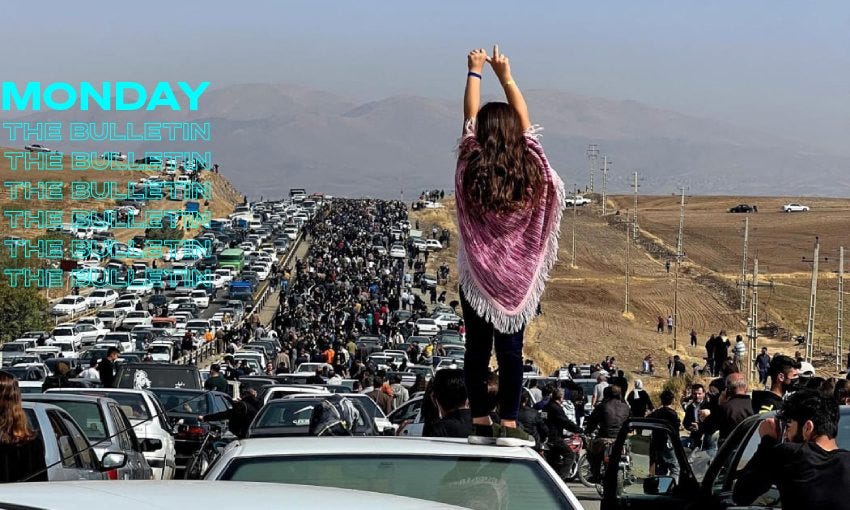Government takes action against Iran
New Zealand has imposed travel bans against members of Iran’s morality police and security forces while Australia imposes sanctions targeting those accused of human rights abuses
In today’s edition: RSE workers living in conditions akin to modern slavery; the biggest frustration of 2022 for the Green party; pause on visas by Australia as it looks to improve the rights of New Zealanders; but first, the government imposes travel bans on members of Iranian security force
It’s been almost three months since protests erupted in Iran following the death of Mahsa Amini in September (Image: RNZ/AFP/UGC)
Travel bans for members of Iranian security forces
This morning, prime minister Jacinda Ardern and foreign minister Nanaia Mahuta announced New Zealand will impose travel bans on members of the Iranian security forces connected to the death of Mahsa Amini and the violent response to the subsequent protests. Included in the ban are members of Iran's morality police, the law enforcement command, and members of the Islamic Revolutionary Guard Corps (IRGC). Iran announced on Thursday that it had carried out the first execution of a protester convicted over the recent anti-government unrest. New Zealand already has a range of sanctions against Iranian individuals and companies by way of United Nations sanctions.
Australia adds Magnitsky sanctions to existing sanction regime
Australia has also imposed sanctions on Iran this weekend, with foreign minister Penny Wong adding Magnitsky-style sanctions against 13 individuals and two entities to the country’s existing autonomous sanctions regime. The sanctions are named for the measures taken against the Russian officials who were thought to be responsible for the death of Russian tax lawyer, Sergei Magnitsky, in 2009. The Conversation has a good explainer on what Magnitsky sanctions are and whether they work, but they differ from traditional sanctions that target nation states by targeting individuals and entities accused of perpetrating human rights abuses.
Promise of wider autonomous sanctions legislation in NZ falls by the wayside
New Zealand does not have an autonomous sanctions regime nor have we adopted Magnitsky laws. There have been calls for New Zealand to have both. When the Russia Sanctions Act was passed in March, Nanaia Mahuta said she would be “stewarding through” a broader autonomous sanctions bill, which would allow New Zealand to impose sanctions outside the United Nations system. As Stuff’s Thomas Manch reported in November, the government was considering whether it could sanction Iran through the Russia sanctions law, and the promise of wider autonomous sanctions legislation has fallen by the wayside.
US warns that Russia and Iran moving towards “a fully fledged defence partnership”
On Friday, White House National Security Council spokesman John Kirby cited US intelligence reporting and said Russia was offering Iran “an unprecedented level of military and technical support that is transforming their relationship into a full-fledged defence partnership”. Ukraine has accused Russia of using Iranian drones in its attacks. After an initial denial, Iran later admitted it had supplied a “limited number” of drones to Russia before the invasion of Ukraine. Ukraine's president Volodymyr Zelensky, who will address our parliament on Wednesday, has said this is a lie and that Ukraine was shooting down about 10 Iranian drones a day.
Get topped up before you even hit the road this summer.
Z Energy’s Sharetank is a better way to buy fuel; a virtual tank you can fill with up to 1000 litres of fuel and which up to five people can use inside the Z app. Sharetank lets you pre-purchase fuel at the cheapest Z price within a 30km radius, all while collecting Flybuys and Airpoints™. And once you’ve bought it, when you use it is up to you – your Sharetank balance won’t expire, so you can move the fuel from the ether and into your ride whenever you want, at any Z station in the country, locked in at the price at which you bought it. Too easy. To learn more and get started, download the Z app today.
Not just a case of a few bad apples
A review of the Recognised Seasonal Employer (RSE) scheme published this morning by the Human Rights Commission has found RSE workers are being subjected to conditions akin to modern slavery. Equal employment opportunities commissioner Saunoamaali'i Karanina Sumeo says it's not a case of a few bad apples, but systemic. The review found numerous instances of human rights breaches including poor housing conditions, workers being banned from travelling or consuming alcohol in their own time, people not being allowed to make dinner for themselves and workers being warned against joining a union. The government raised the quota for the RSE scheme by 3000 this summer in September. It was the biggest increase in the programme in over a decade. It will review the RSE scheme early next year. Massey University academics say Pacific nations are now losing crucial workers to labour schemes in New Zealand and Australia at such volume that their own development prospects are being undermined.
Shaw’s big frustration of 2022? Stalled action on pricing agricultural emissions
More end of year interviews, as the Herald’s Michael Neilson sits down with Green party co-leaders, Marama Davidson and James Shaw. Shaw, who is also climate change minister, said one of the year’s biggest frustrations was stalled action on pricing agricultural emissions and “incrementalism” from other parties in tackling big issues like climate change. Both leaders said they were committed to running in 2023 and beyond provided they were part of a government. The co-leaders were optimistic that they would be expanding their caucus if they were, and once quashed the regular suggestion of working with National in some form via a “teal deal”.
Pause on visas by Australia as it looks to improve the rights of New Zealanders
As Newshub’s Emma Cropper reported on Saturday night, Australia has paused New Zealand applications for the skilled independent (subclass 189) visa for six months. A spokesperson for Australia's home affairs minister said, "As flagged by prime minister Anthony Albanese in July, the Australian government is looking at how we can improve pathways to residency and citizenship for New Zealanders who live in Australia." Hence the pause. A bit of an explainer on the 189 visa mentioned because I was also confused. New Zealanders can stay indefinitely and work full time in Australia automatically but are still only considered temporary residents on the special category visas we get, not permanent residents. The skilled independent (subclass 189) visa allows New Zealanders who meet certain points-based criteria to become permanent residents, which comes with a bunch of benefits and creates a pathway to Australian citizenship.
Click and collect
Good E-Tangata interview with National’s newest MP, Tama Potaka, who heads to parliament today after winning the Hamilton West byelection
Some commentary on which MPs might be announcing their retirements this week from the On The Tiles podcast
An interview with Auckland’s new top cop (paywalled)
How a debate around a blood transfusion in New Zealand became a cause célèbre in online conspiracy circles
As we hit “beyond irritated” about the rain, this holiday forecast was really the only news I was scouring for yesterday
Got some feedback about The Bulletin, or anything in the news? Get in touch with me at thebulletin@thespinoff.co.nz.
If you liked what you read today, share The Bulletin with friends, family and colleagues.
Stewart Sowman-Lund reports on how an open letter to the Listener kicked off an international free speech debate; Holly Thorpe looks at Sport NZ’s new transgender guidelines, and why they’re important; Duncan Greive investigates another week of fresh allegations – and a defamation threat – against We Are Indigo; and Ema Tavola reveals to Christopher Luxon what’s been going on in her South Auckland garage.
Why women make the best spies
This is the last week for The Bulletin this year so I’ll start including some good long reads to bookmark for the holidays. Today’s is from Helen Warrell at the Financial Times on the secret life of MI6’s top female spies. Right now, three of the four directors-general at the Secret Intelligence Service in Britain are women, including “Q”, the fabled head of technology. It’s a turnaround from the days when Vernon Kell, who co-founded MI6’s precursor in 1909, is said to have commented that his ideal recruits were men “who could make notes on their shirt cuff while riding on horseback”, while he liked his girls “to have good legs”. Utterly brilliant read.











